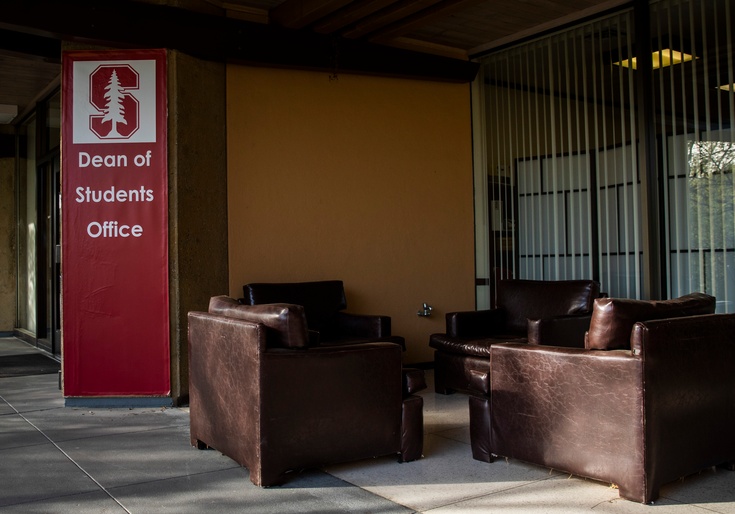If you’ve ever used the phrases "brown bag lunch" or "long time, no see," congratulations: You’re a racist, according to Stanford University.
That’s the judgment of the university’s IT Department, which is rolling out its "Elimination of Harmful Language Initiative," an effort to purge "potentially harmful terms" from the university’s websites. The guide cautions that the phrase "blind study" is "ableist" and that saying "balls to the wall" inappropriately "attributes personality traits to anatomy."
Stanford isn’t alone in its linguistic purge. Down the coast, California Polytechnic State University in San Luis Obispo warns incoming students against saying "father and mother" or "boyfriend and girlfriend," according to a set of instruction slides for student orientation leaders obtained by the Washington Free Beacon. Suggested alternatives to mother and father include "supporter," while the university prefers "partner, beloved or lover" to boyfriend and girlfriend.
Universities and other elite institutions have increasingly embraced "woke" language in a bid to appear progressive. The Biden administration referred to mothers as "birthing people" in its 2022 budget proposal. Stanford is one of several colleges that urge students to use the term "Latinx" to describe Spanish-speaking people, even though most Hispanic people disavow the term.
Both Cal Poly and Stanford apparently worry that mere mention of words commonly used by most Americans will upset their students. They offer "content warnings" before listing problem language like "stupid" and "OCD."
The Stanford guide discourages the use of "gender-based" terms like "landlord" and "mankind." Even the seemingly progressive phrase "preferred pronouns" makes the list, since it "suggests that non-binary gender identity is a choice and a preference." The once-public Stanford list was hidden behind a university login page sometime Monday. The university did not respond to the Free Beacon’s request for comments on the change.
Stanford claims that administrators "are not attempting to address all informal uses of language," but simply "educate people about the possible impact of the words we use." Cal Poly’s language initiative has a loftier aim.
The university’s presentations, which are given to student leaders who run orientations for freshmen and transfers, state that they should do more than switch up their language and adopt gender pronouns. "In order to support trans people in their lives, allies need to dismantle the binary ideas they have of gender in their heads," one slide says.
The Cal Poly materials caution students against using words and phrases like "crazy" or "that’s lame," because they were "used during a time of eugenics against disabled folx, such as forced sterilization and institutionalization."
A Cal Poly spokesman confirmed that the slides have been used in orientation programs "for several years" to promote "using inclusive language around gender and ability." The spokesman added that the speech codes are part of the school’s efforts to promote a "welcoming" campus.
Both Stanford and Cal Poly say they are committed to free speech, which the latter institution avows as a "cornerstone" of democratic societies. But students and faculty say they feel stifled by the speech codes.
"There are people who maybe 5 or 10 years ago would have been in the trenches fighting this stuff with me, but they are even sort of throwing in the hat because it's just bigger than them," said Brian Kennelly, a French professor at Cal Poly. "I think people are just exhausted and if they can just get by unnoticed and get a paycheck that's enough for them, which is so sad."
Kennelly was the only faculty member willing to speak to the Free Beacon on the record. Two Cal Poly instructors who asked to remain anonymous said that students won’t even take rhetorical positions for the sake of argument in class, as they seem afraid of saying something that violates the social justice creed.
"My guess would be there's 30 to 50 percent of the student body who don't buy into this and believe it, but they know they just have to show up and bite their tongue and bide their time," one of these instructors said.
Stanford likewise stresses its free speech imperative. The university’s top leaders, however, have sought to temper its First Amendment mandate with concerns for those "who are negatively impacted by speech" and acknowledgment of the "additional challenge" of "outside speakers who may be controversial."
One Cal Poly instructor said the science and engineering-focused university—long considered the "crown jewel" of the California State University system—has seen a complete "brand shift" as the campus became consumed by social justice.
"I don’t think it’s going to end well for the institutions," the instructor said.
Kennelly worries about the effect on an entire generation.
"If we are expecting our students to all kind of walk in lockstep and have this group think and basically be brainwashed," Kennelly said, "they're going to be incapable of engaging in the way that we would normally expect a college student to engage."
